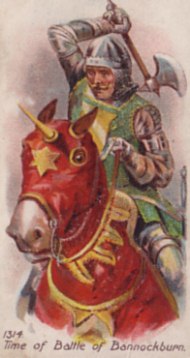
On June 24, 1314, the Scots defeated the English army by a resounding victory on the field of Bannock Burn. Vastly outnumbered and facing heavy cavalry, the Scots were led by King Robert Bruce, whose tactical skill won the day. In spite of some military successes on June 23, "The Bruce" knew that victory on St. John's Day was not a foregone conclusion. From an old account:
Robert, on the other hand, was under no illusions at to what he would face the following day. Despite the high spirits flowing from the day's victories, the English army was still intact and greatly outnumbered him. His victories that day would allow him to withdraw with honor which is what he planned to do until an English knight, Sir Alexander de Seton, made his way to the Scottish camp. Brought before Robert, he told of the weak and dispirited condition of their army and pledged on his own life that if Robert was to fight the following day, he would win. Robert, therefore, has two choices if he chose to fight. He could remain with his back to the wood in a defensive position and risk being outflanked or to attack before the English could properly deploy, forcing them to fight on unfavorable ground - he chose the latter.
The Scot army rose at dawn on the 24th and by 3:45am it was light enough to see clearly. As they celebrated mass, those who had shown great courage were knighted, including Randolph and Douglas. Full of confidence from the previous day, they formed their divisions and received the order to advance.
Advancing in echelon, Douglas to the left, Randolph at the centre and Edward Bruce to the right, they poured from the wood with a cry. Robert remained with the cavalry and his own division to the flank of Edward Bruce out of sight of the English.
The English, with their split force, were temporarily stunned at the Scottish advance believing they would fight defensively and allowed them to within 100 yards before the order for them to form was given. Suddenly, the Scots halted and dropped to their knees in prayer. Seeing this, Edward sneered, "They kneel to ask for mercy." Sir Ingram de Umfraille, a Scot in English employ replied, "You say sooth now, they ask for mercy, but not of you. Those men will win or die." The king simply replied, "Be it so" and ordered the English advance. (More here.)
Scots, wha hae wi' Wallace bled,
Scots, wham Bruce has aften led,
Welcome to your gory bed
Or to victorie!
Now's the day, and now's the hour:
See the front o' battle lour,
See approach proud Edward's power
Chains and slaverie!
Wha will be a traitor knave?
Wha can fill a coward's grave?
Wha sae base as be a slave?
Let him turn, and flee.
To the Scots, who had faced many betrayals by their own, there was nothing lower than a false friend. To be a liar and a traitor was to be a coward; to be a coward was to be a slave. But on June 24, 1314, courage and loyalty prevailed over tyranny.
More background from Historic UK:
Following the killing of an English sheriff by William Wallace, revolts broke out in Scotland and on 11th September at the Battle of Stirling Bridge, Wallace defeated English forces led by John de Warenne. The following month the Scots raided northern England...Wallace was appointed Guardian of Scotland in March; however in July Edward invaded again and defeated the Scottish army, led by Wallace at the Battle of Falkirk. Following the battle Wallace went into hiding...Further campaigns by Edward in 1300 and 1301, led to a truce between the Scots and English. (Read more.)Share


















1 comment:
Legend has it that it was the presence of the recently suppressed Knights Templar that made the victory possible. This is contrary to most histories, many of which say that camp followers banging on pots and pans were helpful in frightening off the English.
The Templar theory may be fanciful, but I'm buying it! :)
Post a Comment